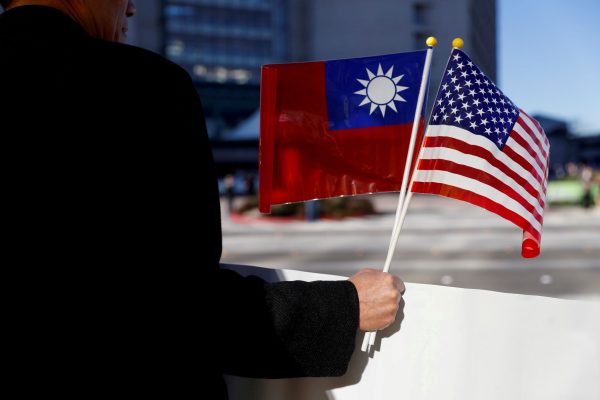Biden has a long history of support for Taiwan. He was already a member of the US Senate in 1979 when the Taiwan Relations Act was approved. When he became chair of the Senate Foreign Relations Committee in 2001, his first overseas visit was to Taiwan. And in January 2020, then-candidate Biden congratulated Taiwanese President Tsai Ing-wen on her re-election, stating ‘You are stronger because of your free and open society. The United States should continue strengthening our ties with Taiwan and other like-minded democracies’.
There are ample reasons for a Biden administration to continue the broad support for Taiwan that was built up in the latter half of the Trump administration. Biden’s cabinet appointments will also be critical. Michele Flournoy, who is mentioned often as a potential defence secretary, has written extensively about the US role in counteracting threats facing Taiwan from China. Other recurring names include former assistant secretary of state Kurt Campbell, and members of the Biden–Harris team such as Ely Ratner of the Center for a New American Security and Julie Smith of the German Marshall Fund, who have all written and spoken extensively on how to enhance US relations with Taiwan.
There is no doubt that President Donald Trump’s ‘America First’ policy — and his withdrawal from international agreements and fora such as the Trans Pacific Partnership, the Paris Climate Accord and the World Health Organization — put him at odds with US friends and allies and undermined US leadership.
Trump’s adversarial and transactional relationship with many of Europe’s leaders, and his demands that Japan and South Korea pay fivefold for basing agreements further estranged the United States from its traditional allies. This weakened the US position in the increasingly tense strategic competition with China.
This doesn’t mean that other countries are not concerned about China’s behaviour. China’s predatory trade practices, ‘wolf warrior’ diplomacy, unsubtle influence operations, repression of Uyghurs, imposition of a national security law in Hong Kong and increasingly shrill military threats against Taiwan concern other nations. But the isolationist, uncoordinated approach of Trump was not effective, the efforts of Secretary of State Mike Pompeo to draw in other countries notwithstanding.
Despite this turmoil, Taiwan’s position and US Taiwan policy escaped relatively unscathed. Under the guidance of National Security Advisor John Bolton, Assistant Secretary of Defense Randall Schriver, Assistant Secretary David Stilwell and Secretary Pompeo, there was a comprehensive effort to support Taiwan which made great headway within a relatively short time.
A major driver of these efforts was the US Congress which, with bipartisan support, passed several key pieces of legislation, such as the Taiwan Travel Act (February 2018), the Asia Reassurance Initiative Act (December 2018) and the TAIPEI Act (March 2020), all aimed at enhancing US–Taiwan relations.
The transition to the Biden administration is taking place against a background of sharp differences between the old and new US administrations on how to conduct foreign policy. But ironically, the respective visions on Taiwan are similar. This is due to several fundamental changes in the perception of Taiwan among the foreign policy community in Washington.
First, democratic values are increasingly the guiding principle in US relations with Taiwan. When the United States and other Western nations switched recognised away from the Kuomintang government of Chiang Kai-shek in the 1970s, it was a repressive authoritarian dictatorship claiming to be government of all of China. For too long the policies of the United States and other Western nations towards Taiwan remained a subset of relations with China. Today, Taiwan needs to be seen in its own light and its own right, as a beacon for democracy in Asia.
Second, the global perception of China has changed dramatically in recent years. The basic approach towards China used to be one of ‘engagement’, in the hope that China would become a ‘responsible stakeholder’. But since President Xi Jinping came to power, it has become increasingly clear that the People’s Republic of China (PRC) has become more repressive domestically, and more aggressive internationally, leading most Western nations to refer to it as a ‘strategic competitor’.
Third, since the election of President Tsai Ing-wen in January 2016, the PRC government has launched increasingly shrill threats and intimidation campaigns against Taiwan. The People’s Liberation Army (PLA) Air Force has sent fighter aircraft across the median line in the Taiwan Strait, PLA Navy ships circumnavigate the island, and the PLA held military exercises on the Chinese coast north and south of Taiwan. The PRC has also conducted an unrelenting disinformation and cyber warfare campaign against the young democracy.
These three developments are ample reason for a Biden administration to continue the broad support for Taiwan that was built up in the latter half of the Trump administration. In order to achieve its foreign policy goals in a more balanced and coordinated way, the Biden administration is likely to deploy an array of measures, ranging from diplomatic pressure on China, enhancing economic ties with Taiwan and continuing to strengthen Taiwan’s defence capabilities.
We can expect the Biden administration to work more closely with traditional friends and allies to convince Beijing that it needs to accept Taiwan as a friendly neighbour. It is essential that allies in Europe, Japan, India, Australia and New Zealand jump on the bandwagon. Time is of the essence.
Gerrit van der Wees is a lecturer at George Mason University and George Washington University.

